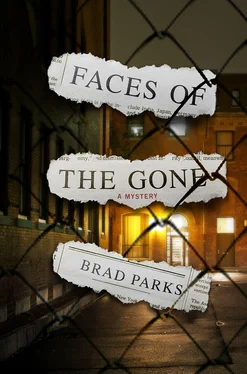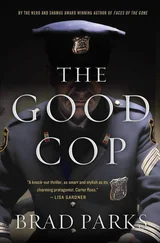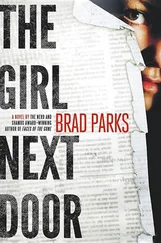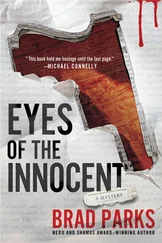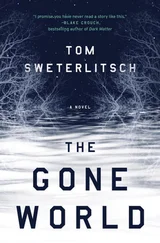Brad Parks - Faces of the Gone
Здесь есть возможность читать онлайн «Brad Parks - Faces of the Gone» весь текст электронной книги совершенно бесплатно (целиком полную версию без сокращений). В некоторых случаях можно слушать аудио, скачать через торрент в формате fb2 и присутствует краткое содержание. Год выпуска: 2010, ISBN: 2010, Издательство: Minotaur Books, Жанр: Триллер, на английском языке. Описание произведения, (предисловие) а так же отзывы посетителей доступны на портале библиотеки ЛибКат.
- Название:Faces of the Gone
- Автор:
- Издательство:Minotaur Books
- Жанр:
- Год:2010
- ISBN:9780312574772
- Рейтинг книги:3 / 5. Голосов: 1
-
Избранное:Добавить в избранное
- Отзывы:
-
Ваша оценка:
- 60
- 1
- 2
- 3
- 4
- 5
Faces of the Gone: краткое содержание, описание и аннотация
Предлагаем к чтению аннотацию, описание, краткое содержание или предисловие (зависит от того, что написал сам автор книги «Faces of the Gone»). Если вы не нашли необходимую информацию о книге — напишите в комментариях, мы постараемся отыскать её.
Faces of the Gone — читать онлайн бесплатно полную книгу (весь текст) целиком
Ниже представлен текст книги, разбитый по страницам. Система сохранения места последней прочитанной страницы, позволяет с удобством читать онлайн бесплатно книгу «Faces of the Gone», без необходимости каждый раз заново искать на чём Вы остановились. Поставьте закладку, и сможете в любой момент перейти на страницу, на которой закончили чтение.
Интервал:
Закладка:
But while the government was congratulating itself on the plummeting cocaine traffic on America’s streets, the Colombians were busy rolling out a new product line. And it was one the feds and their spy satellites weren’t looking for: heroin. It was an almost instant hit. The Colombians had been hooking America on cocaine for years and had the supply routes, distribution systems, and retail muscle to move massive quantities of the drug at never-before-seen purity levels.
The heroin of the seventies was perhaps 5 or 10 percent pure. The rest of it was baking soda or aspirin or whatever additive a dealer could find to cut it with. The heroin of the new millennium was 50, 70, even 90 percent pure and delivered its high-and addictive powers-with corresponding efficiency.
The second thing Uncle Sam did to help the Director’s operation was to declare a War on Terror. After 9/11, America’s picture of evil changed overnight. It was no longer the swarthy Colombian drug lord in a linen suit. It was now the straggly bearded Muslim extremist. For every new wall of protection the U.S. built against the Middle East menace, a piece of the wall that once kept the Colombians at bay came tumbling down.
New Jersey proved a particularly ideal entry point. It had the infrastructure, with a major international airport, a bustling seaport, and a vast highway network sprawling in every direction. It had the geography, being wedged in between New York and Philadelphia in the heart of the Northeast corridor. And it had the demography, with a densely packed population spread over urban areas (where most drugs are sold) and suburban areas (where most drugs are stashed and, yes, consumed).
The third thing the U.S. government did was kick the Taliban out of Afghanistan. The Taliban had ruthlessly suppressed poppy production. But with the Taliban out, Afghani farmers who had been growing poppies for generations got right back into business. All it took was a few growing seasons for Afghanistan to transform into the world’s newest narco-state.
That meant the Colombians had competition. They responded by pushing even more product across the borders in an effort to keep up, to the point where they were getting sloppy with it.
And it was the Colombians’ sloppiness that was allowing the Director to grow rich.
CHAPTER 2
My four-year-old Chevy Malibu-practical, dependable, and the last vehicle any self-respecting Newark carjacker would ever want-was parked in the garage across the street. When I bought it a year ago, I had taken endless ribbing from my newspaper friends. Apparently, a used Malibu isn’t considered the car of choice among highly eligible bachelors such as myself. My friends from Amherst, most of whom made Michael Moore look like a Bush family toady, chided me for not buying a hybrid that ran on lawn clippings.
But while I wholeheartedly support the development of renewable energy sources, damn if I’m going to drive some oversized golf cart. I’ll give up my gas-powered V6 just as soon as someone gives me an alternative that actually moves when I press down the accelerator.
As I got in the car, I turned on the radio, switching to a Top 40 station. The same liberal friends who disapproved of my choice of transportation also rolled their eyes at my music. But there’s only so much NPR a man can take.
“Oooh, I love this song,” Tommy said.
“Should I be worried I agree with you?”
“What do you mean? You’re worried you might actually have good taste for once?” Tommy said, turning it up and singing along, loud and off-key. Nothing like driving through Newark blasting music that announces, “We’re not from here.”
We soon crossed into Irvington, a city that’s like Newark but with fewer redeeming qualities. Irvington was once a blue-collar town that was only slightly down on its luck. Then Newark demolished its public housing high-rises, dispersing all the crime and dysfunction that had once been concentrated there. Irvington, like other towns nearby, had been caught completely unprepared and went into the toilet practically overnight.
The Stop-In Go-Go was no exception. Occupying a dingy, windowless corner storefront, it had as its only neighbors a bodega and a liquor store. Its backlit sign-which featured the silhouette of a curvaceous, long-legged dancer-had to be at least half a century old.
“If it gets out in the gay community I went to a place like this, I’ll be forever ostracized,” Tommy said as we parked and exited the car.
Intellectually, I knew strip clubs were offensive: they objectified the female gender, perpetuated wrongheaded ideas about sexuality, and opened young women to all kinds of potential exploitation. For those reasons, I avoided them.
Unless, of course, I was drunk. If you threw a couple beers in me, I had to admit I didn’t mind watching a woman take off her clothes. And judging by how much it lightened my wallet by the end of the evening, I could make a fair argument the exploitation went both ways.
The Stop-In Go-Go was not actually a strip club, mind you. It was a go-go bar, and in Jersey there was a difference: strip clubs could go all-nude but didn’t have booze; go-go bars had alcohol, but the dancer’s choicer bits needed to stay covered. Granted, a careless dancer might “unintentionally” flash a little nipple or a bit of muff. Accidents happen in every industry.
As we entered, we were barreled over by a smell that was one part male pheromone, two parts Coors Light, and three parts stale sweat. The Stop-In Go-Go may have been poisoning the environment in any number of ways, but the overuse of cleaning products wasn’t one of them.
“I’m afraid to sit down,” Tommy whispered. “I might stick to something.”
“That’s half the charm,” I said. “What are you drinking? This is no place to be sober.”
“How about a cran-apple Cosmo?” he asked.
“I don’t think they’ve heard of those here,” I said as I caught the attention of the bartender. “Two Buds, please.”
“We’re not going to start talking about sports now, are we?” Tommy asked.
“No, I think just being here is sufficient torture for you,” I said, then flipped two twenties down on the bar and turned to the bartender. “Mind giving me change in singles?”
“Oh, my God, you’re not really going to?” Tommy asked, horrified.
“Of course I am. I’ve got to play the part. I’m just wondering how exactly I’m going to put this down on my expense report.”
I grabbed the two beers and my pile of singles, then turned my attention to the small stage in the middle of the room. There, two dancers gyrated in robotic fashion to some tiresome bit of club music, their expressions blank, their minds elsewhere. The only person who could have possibly been more bored was Tommy.
One of the women was a thick-legged, bleached blonde who occasionally graced one of the patrons with a come-on in Russian-accented English. The other woman had to be Tynesha, a not-insubstantial black woman wearing just enough clothing to keep the Stop-In Go-Go from getting fined.
I sat down at one of the barstools ringing the stage and gestured for Tommy to sit next to me. Tynesha started dancing our way, wasting no time pouncing on fresh meat. I pulled a single out of my pocket and held it in the air. Chum couldn’t have made a shark come quicker.
“Thanks, baby,” she said as I slipped her a dollar, being careful not to let my hand linger in a way that might later be deemed professional misconduct.
“You’re welcome,” I said.
“Oohhh. You’re my white boy. I knew you’d be gorgeous.”
I forced a smile. Her eyes were amber-colored, from contact lenses. And when she smiled back it gave her a freaky look-the golden-eyed harlot.
Читать дальшеИнтервал:
Закладка:
Похожие книги на «Faces of the Gone»
Представляем Вашему вниманию похожие книги на «Faces of the Gone» списком для выбора. Мы отобрали схожую по названию и смыслу литературу в надежде предоставить читателям больше вариантов отыскать новые, интересные, ещё непрочитанные произведения.
Обсуждение, отзывы о книге «Faces of the Gone» и просто собственные мнения читателей. Оставьте ваши комментарии, напишите, что Вы думаете о произведении, его смысле или главных героях. Укажите что конкретно понравилось, а что нет, и почему Вы так считаете.
